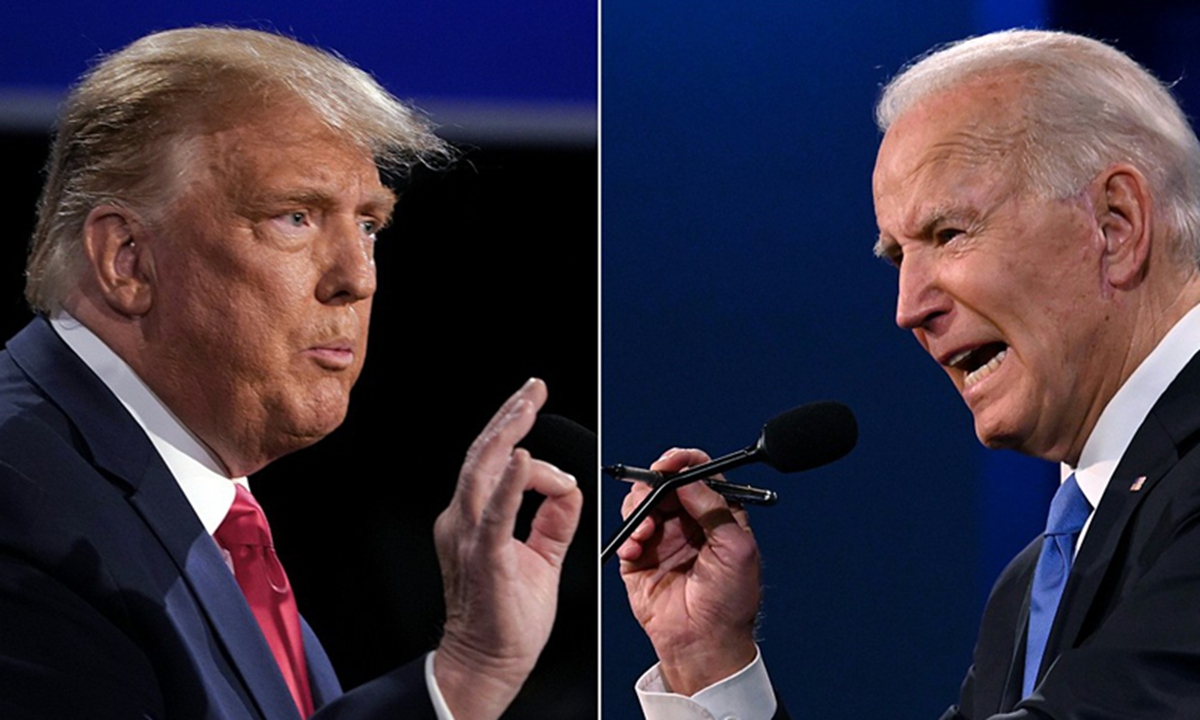Misleading polls distort reality, show failed elite media mentality in US
By Li Haidong Source: Global Times Published: 2020/11/4 18:21:29

Photo: VCG
The US presidential election is still going on - ballots are being counted. President Donald Trump has won Florida's 29 electoral votes, defeating his Democratic rival, former vice president Joe Biden in an important battleground. Trump was also taking a lead by more than 10 percentage points in Pennsylvania as of press time.
Such a situation is very different from previous statistics many US media and polling organizations said that Biden was holding a strong advantage in most national surveys of voters.
For example, in the final national NBC News/Wall Street Journal poll before the election released on Sunday, Biden maintained his double-digit national lead over Trump and that a majority disapproved of Trump's handling of COVID-19.
But again, these polls are very different from the results. And there are mainly two reasons: First, there are defects in these polls' design and sampling process. Second, some of Trump's supporters may not have been honest during the surveys. Some analysts believe that Trump has a lot of "shy voters" who do not want to tell others their position. People may have lied in the pollsters. This makes it seems that very few pollsters are accurate now.
In the 2016 US presidential election, there was a big gap between statistics from major US polling organizations and the final results. Many people began questioning relevant opinion polls. The credibility of US media outlets and some polling institutions has already been damaged. When making predictions over unusual persons like Trump, deviations can easily emerge if there are no relevant investigations with unusual methods.
Elites usually dominate the polls in the US. As a matter of fact, some polling organizations have already realized that they did not make proper distinctions between well and poorly educated respondents.
While they made some related improvements, the results of opinion polls still cannot reflect the truth. It illustrates that when elites plan and design the polls, they can hardly grasp the true feelings of grass roots. Meanwhile, ordinary polling companies cannot afford the cost of conducting field investigations. In the end, the gap between elites and common people continues to swell.
Besides, a number of questions in some public opinion polls are filled with strong political bias. Certain US media outlets have also become tools of US political infighting. As a result, the outcome of the polls can hardly remain objective. Polling organizations will certainly exist for a long time. But they are in need of drastic reforms with their methods and content to keep up with the times. If the polls cannot reflect reality, they will eventually die out.
Surprisingly, when there are more than 230,000 coronavirus deaths in the US; The Democratic Party showed unprecedented unity; A large number of young people are going out to vote; Countless celebrities and scientists are publicly supporting Biden, people see no wide racial gap between the two candidates. Observers from other parts of the world generally believe that the epidemic would be a key factor affecting election results. But it seems that US people are more concerned about economic issues. Previously, people tend to ask which is more important for Americans? Health or economy? Now we have an answer. The election shows that a considerable number of US citizens think economy is more significant than handling the public health crisis.
The political demands of populist groups in US society are becoming stronger. For instance, a large swath of people firmly believe in a presidential candidate who does not believe in science at all. It mirrors the anti-intellectualism is becoming a trend, even a culture in the US. Those populist forces and trends will pose an increasing influence in US domestic politics and diplomacy. This is not a positive sign for the US, and the world.
The author is a professor at Institute of International Relations, China Foreign Affairs University. opinion@globaltimes.com.cn
RELATED ARTICLES:
Posted in: VIEWPOINT